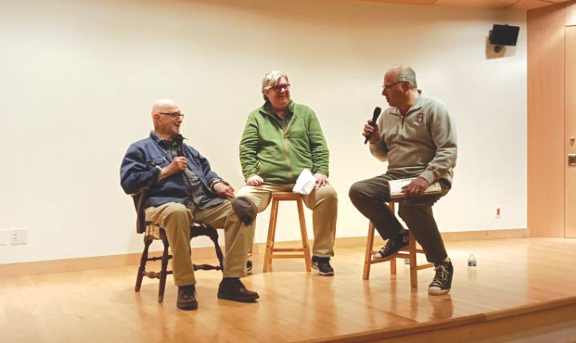
Artist Jules Feiffer (left) discusses his career with Bill Francis and Jeff Katz. (Photo by Darlene Wedderspoon)
Feiffer Hosts Film Screening of ‘Little Murders’ at Fenimore Art Museum
By WRILEY NELSON
COOPERSTOWN
Pulitzer Prize-winning cartoonist and Richfield Springs resident Jules Feiffer returned to the spotlight on May 19 for a screening of his 1971 film “Little Murders” at Fenimore Art Museum. “Little Murders” is a black comedy about a young, professional woman who brings her nihilistic and nearly catatonic boyfriend home to her dysfunctional family. It paints a dark portrait of a society collapsing under the weight of random violence, obscene phone calls, random shootings, garbage strikes, electrical blackouts and paranoia.
The film, directed by Alan Arkin and starring Elliott Gould and Marcia Rodd, received perfect four-star ratings from Roger Ebert and Gene Siskel.
“Little Murders” opens with Patsy Newquist (Rodd), a New York interior designer, rescuing Alfred Chamberlain (Gould) from a beating at the hands of street toughs. She becomes fascinated with Chamberlain, an obsessive photographer who is emotionally vacant and has neither the ability nor desire to feel pain or pleasure. He usually allows criminals to beat him “until they get tired” and move on. Patsy, who has a long history of “molding” men, accepts Chamberlain as her ultimate challenge. She takes him on a stunning montage of expensive, romantic dates, introduces him to her wildly dysfunctional family and attempts to get to the bottom of his emotional state.
The film is a caustic comedy with biting, disorienting satire and brilliant performances. A young Donald Sutherland questions reality until your head spins with an endless wedding sermon as the existential Reverend Henry Dupas. Lou Jacobi, as Judge Stern, gives another hilarious, interminable monologue on New York’s immigrant past and the decline in public religiosity. “Little Murders” more than fulfills its tagline: “Funny in a new and frightening way.”
Feiffer, 94, opened the Film Society of Cooperstown event with a brief conversation with Bill Francis and Jeff Katz. Feiffer gave an overview of his life and career, beginning with his apprenticeship under master cartoonist Will Eisner.
“Eisner put me to work doing nothing, because I was qualified for nothing, and he paid me nothing,” Feiffer recalled.
He spoke about the rise and fall of the graphic novel as an art form and reflected on his friendship with Art Spiegelman, author of “Maus.” In response to queries by Francis, Feiffer discussed the inspiration and production of “Little Murders.”
Feiffer began the work as a novel in the mid-1960s as a response to the random violence he saw on the news.
“I saw the Kennedy assassination on TV, then the [University of] Texas tower shooting. I knew that something had changed, that this country was no longer the same…that these were not aberrations, they were our future,” he said. “I looked around and no one seemed to see what I was seeing. I didn’t see any analysis, any acknowledgment. I knew that if no one else was going to write about it, I had to.”
“I discovered after two years of work that I wasn’t a novelist,” Feiffer said.
After realizing that he was more effective as a playwright, he turned out a first draft in three weeks. The first run of “Little Murders” on Broadway was “a disaster,” but the play enjoyed an off-Broadway renaissance after a successful run in the United Kingdom.
Feiffer closed with a reflection on his new life in Otsego County. He and his wife, J.Z. Holden, moved upstate from Long Island in search of a cleaner environment following severe health issues. Feiffer survived a serious cardiac event that required resuscitation; “this is the version of me that came back,” he joked.
The rural environment and thriving small communities helped inspire him to continue his cartooning at his old pace. Asked for the secret of his longevity, Feiffer replied, “I always wanted to be a boy cartoonist, and I still am.”

